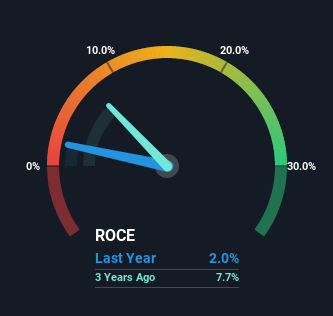- Hong Kong
- /
- Paper and Forestry Products
- /
- SEHK:8191
Hong Wei (Asia) Holdings (HKG:8191) Will Be Hoping To Turn Its Returns On Capital Around
What underlying fundamental trends can indicate that a company might be in decline? When we see a declining return on capital employed (ROCE) in conjunction with a declining base of capital employed, that's often how a mature business shows signs of aging. Ultimately this means that the company is earning less per dollar invested and on top of that, it's shrinking its base of capital employed. Having said that, after a brief look, Hong Wei (Asia) Holdings (HKG:8191) we aren't filled with optimism, but let's investigate further.
Return On Capital Employed (ROCE): What is it?
Just to clarify if you're unsure, ROCE is a metric for evaluating how much pre-tax income (in percentage terms) a company earns on the capital invested in its business. To calculate this metric for Hong Wei (Asia) Holdings, this is the formula:
Return on Capital Employed = Earnings Before Interest and Tax (EBIT) ÷ (Total Assets - Current Liabilities)
0.02 = HK$8.3m ÷ (HK$752m - HK$342m) (Based on the trailing twelve months to September 2021).
Thus, Hong Wei (Asia) Holdings has an ROCE of 2.0%. Ultimately, that's a low return and it under-performs the Forestry industry average of 8.3%.
Check out our latest analysis for Hong Wei (Asia) Holdings

While the past is not representative of the future, it can be helpful to know how a company has performed historically, which is why we have this chart above. If you'd like to look at how Hong Wei (Asia) Holdings has performed in the past in other metrics, you can view this free graph of past earnings, revenue and cash flow.
What Does the ROCE Trend For Hong Wei (Asia) Holdings Tell Us?
In terms of Hong Wei (Asia) Holdings' historical ROCE movements, the trend doesn't inspire confidence. To be more specific, the ROCE was 9.1% five years ago, but since then it has dropped noticeably. Meanwhile, capital employed in the business has stayed roughly the flat over the period. Since returns are falling and the business has the same amount of assets employed, this can suggest it's a mature business that hasn't had much growth in the last five years. If these trends continue, we wouldn't expect Hong Wei (Asia) Holdings to turn into a multi-bagger.
On a side note, Hong Wei (Asia) Holdings' current liabilities are still rather high at 45% of total assets. This effectively means that suppliers (or short-term creditors) are funding a large portion of the business, so just be aware that this can introduce some elements of risk. Ideally we'd like to see this reduce as that would mean fewer obligations bearing risks.
The Bottom Line On Hong Wei (Asia) Holdings' ROCE
In the end, the trend of lower returns on the same amount of capital isn't typically an indication that we're looking at a growth stock. Unsurprisingly then, the stock has dived 89% over the last five years, so investors are recognizing these changes and don't like the company's prospects. With underlying trends that aren't great in these areas, we'd consider looking elsewhere.
If you want to know some of the risks facing Hong Wei (Asia) Holdings we've found 5 warning signs (2 are concerning!) that you should be aware of before investing here.
If you want to search for solid companies with great earnings, check out this free list of companies with good balance sheets and impressive returns on equity.
Valuation is complex, but we're here to simplify it.
Discover if Hong Wei (Asia) Holdings might be undervalued or overvalued with our detailed analysis, featuring fair value estimates, potential risks, dividends, insider trades, and its financial condition.
Access Free AnalysisHave feedback on this article? Concerned about the content? Get in touch with us directly. Alternatively, email editorial-team (at) simplywallst.com.
This article by Simply Wall St is general in nature. We provide commentary based on historical data and analyst forecasts only using an unbiased methodology and our articles are not intended to be financial advice. It does not constitute a recommendation to buy or sell any stock, and does not take account of your objectives, or your financial situation. We aim to bring you long-term focused analysis driven by fundamental data. Note that our analysis may not factor in the latest price-sensitive company announcements or qualitative material. Simply Wall St has no position in any stocks mentioned.
About SEHK:8191
Hong Wei (Asia) Holdings
An investment holding company, engages in the manufacture and sale of particleboards in the People’s Republic of China.
Slight risk and slightly overvalued.
Market Insights
Community Narratives


